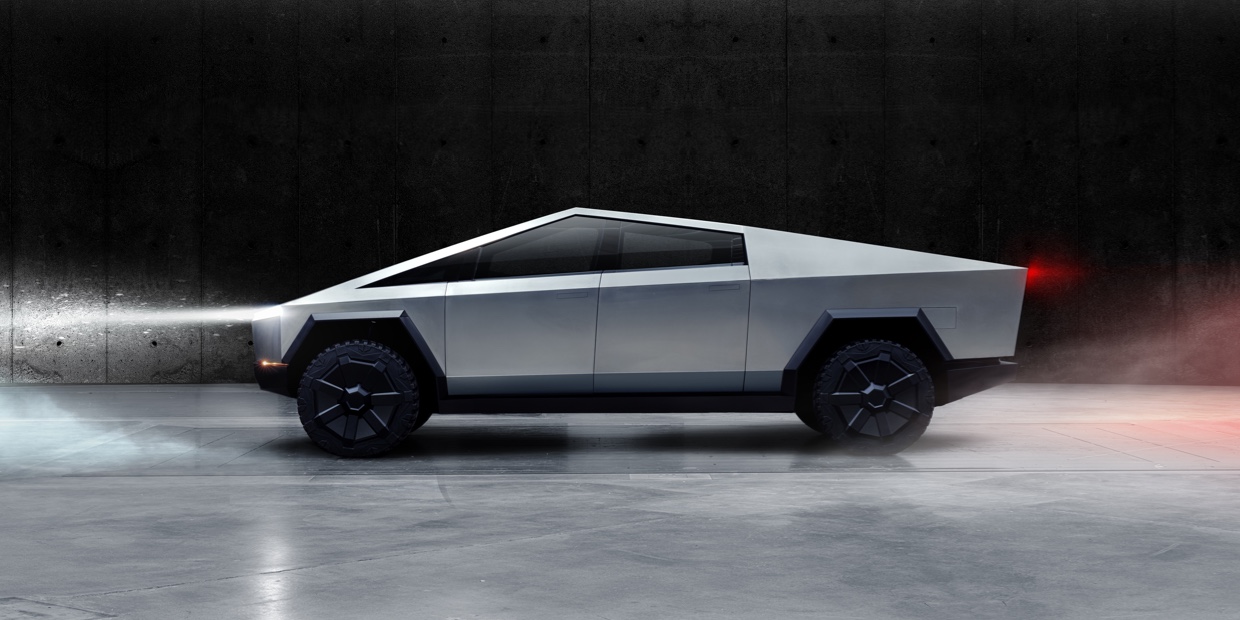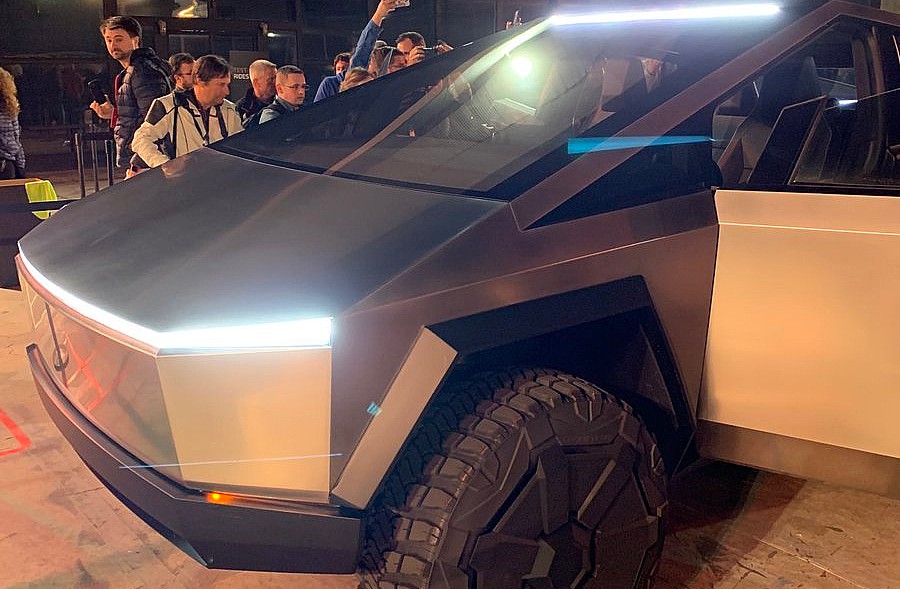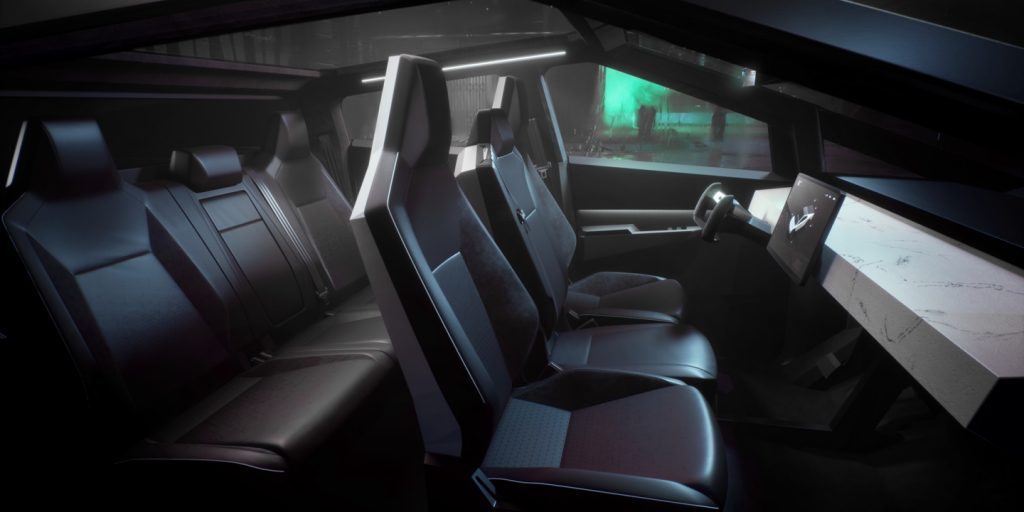

News
Tesla’s Cybertruck is not a bet-the-company vehicle, and it should scare TSLA critics
The Tesla (NASDAQ:TSLA) Cybertruck’s unveiling event could have easily gone better, with the vehicle’s disruptive specs and pricing pretty much getting pushed to the background by media coverage of the pickup’s less-than-stellar Armor Glass demonstration. Cracked windows aside, the fact remains that the Cybertruck starts at $39,990, a price that’s as aggressive as the vehicle’s almost brutalist design. It’s also a price that shows that Tesla is at a point where it actually can experiment and be bolder than usual. This should scare TSLA critics.
The Cybertruck is a massive vehicle, as long as a Ford F-150 and far more powerful as teased by the company’s tug-of-war demo that it briefly showed during the pickup’s unveiling. It’s also unapologetically futuristic, with a 17″ landscape infotainment screen that’s not found in any of Tesla’s other vehicles. It has pop-out door handles that are directly inspired by the premium-priced Model S as well. And these are just the tip of the iceberg, as the Cybertruck has a ton of other features and capabilities that make it a great vehicle for work and play.
Yet, the monster of a truck that Tesla unveiled starts at a price that’s just slightly above the base price of the Model 3 sedan. There was a reason why gasps could be heard at the vehicle’s unveiling when the Cybertruck’s pricing was revealed. Elon Musk has noted during his interview with Tesla owner-enthusiast Ryan McCaffrey last June that the Cybertruck will start at $49,000 at the most. Absolutely no warning was given that Tesla was going for a far more aggressive starting price, especially considering the vehicle’s built-in tech such as its adaptive suspension and basic Autopilot capabilities.

The fact that the Cybertuck is designed in such a polarizing manner suggests that Tesla has some funding to spare. By releasing such a vehicle, the electric car maker has shown the auto market that it is at a point where it can be bold and take ridiculous risks such as releasing a truck that looks nothing like a conventional pickup. Elon Musk has admitted as much, noting during an appearance at veteran tech journalist Kara Swisher’s Recode Decode podcast that if the Cybertruck were to fail, Tesla will make a more conventional truck. Musk’s words then, spoken over a year ago, rings true today.
“I’m personally super-excited by this pickup truck. It’s something I’ve been wanting to make for a long time. And I’ve been iterating sort of designs with Franz. If there’s only a small number of people that like that truck, I guess we’ll make a more conventional truck in the future. I think this is the kinda thing the consumer would want to buy, even if they don’t normally buy a pickup truck. So, anyway, that’s personally I’m most excited about. But like I said, it could be just like, okay, I weirdly like it and other people don’t. That’s possible. But we’re gonna make it anyway, and then we will just have a niche audience, I don’t know. But if it does, then we’ll make a more conventional pickup truck,” Musk said.

Tesla has, for the most part over the years, operated with limited resources. Elon Musk is a risk-taker, and some of these were so notable that they were considered as “bet-the-company” situations. The Model 3 was one of these, with Musk noting that if the all-electric sedan were had failed, it would have likely ruined Tesla for good. Considering the bold direction that the company took with the Cybertruck, as well as Elon Musk’s statements last year, it definitely appears that the all-electric monster pickup that Tesla just unveiled is not a bet-the-company vehicle. It is a truck that would be great if it succeeded, but it is also a vehicle that could be replaced if it were to fail.
This should be a chilling thought for Tesla critics, particularly those who feverishly wait for the next quarter’s numbers in their excitement to see TSLA stock drop. After all, if the Cybertruck were to fail and if Tesla were to make a conventional pickup truck, there is a good chance that the company’s more traditional truck would be even more aggressively priced. Such a pickup would likely outperform diesel-powered rivals as well in classic Tesla fashion as well. Such a truck, combined with Tesla’s ever-growing charging infrastructure and its ever-evolving Autopilot system, would have the potential to clean house in a manner that is not as kind as the Cybertruck, which will always be polarizing.
Tesla is a resilient company, one that weathered one of the worst financial crises in recent history, and it’s led by a man that’s hell-bent on pushing sustainable transportation by proving that electric cars are better in every way than fossil fuel-powered vehicles. It’s best to note that a Tesla with limited resources has proven that it can still disrupt established industries with well-designed, safe, and feature-rich electric cars. A Tesla with resources to spare? That’s a downright frightening idea if one is a TSLA critic.
Disclosure: I have no ownership in shares of TSLA and have no plans to initiate any positions within 72 hours.
News
Tesla begins Robotaxi certification push in Arizona: report
Tesla seems serious about expanding its Robotaxi service to several states in the coming months.

Tesla has initiated discussions with Arizona transportation regulators to certify its driverless Robotaxi service in the state, as per a recent report from Bloomberg News. The move follows Tesla’s launch of its Robotaxi pilot program in Austin, Texas, as well as CEO Elon Musk’s recent comments about the service’s expansion in the Bay Area.
The Arizona Department of Transportation confirmed to Bloomberg that Tesla has reached out to begin the certification process for autonomous ride-sharing operations in the state. While details remain limited, the outreach suggests that Tesla is serious about expanding its driverless Robotaxi service to several territories in the coming months.
The Arizona development comes as Tesla prepares to expand its service area in Austin this weekend, as per CEO Elon Musk in a post on X. Musk also stated that Tesla is targeting the San Francisco Bay Area as its next major market, with a potential launch “in a month or two,” pending regulatory approvals.
Tesla first launched its autonomous ride-hailing program on June 22 in Austin with a small fleet of Model Y vehicles, accompanied by a Tesla employee in the passenger seat to monitor safety. While still classified as a test, Musk has said the program will expand to about 1,000 vehicles in the coming months. Tesla will later upgrade its Robotaxi fleet with the Cyercab, a two-seater that is designed without a steering wheel.
Sightings of Cybercab castings around the Giga Texas complex suggests that Tesla may be ramping the initial trial production of the self-driving two-seater. Tesla, for its part, has noted in the past that volume production of the Cybercab is expected to start sometime next year.
In California, Tesla has already applied for a transportation charter-party carrier permit from the state’s Public Utilities Commission. The company is reportedly taking a phased approach to operating in California, with the Robotaxi service starting with pre-arranged rides for employees in vehicles with safety drivers.
News
Tesla sets November 6 date for 2025 Annual Shareholder Meeting
The automaker announced the date on Thursday in a Form 8-K.

Tesla has scheduled its 2025 annual shareholder meeting for November 6, addressing investor concerns that the company was nearing a legal deadline to hold the event.
The automaker announced the date on Thursday in a Form 8-K submitted to the United States Securities and Exchange Commission (SEC). The company also listed a new proposal submission deadline of July 31 for items to be included in the proxy statement.
Tesla’s announcement followed calls from a group of 27 shareholders, including the leaders of large public pension funds, which urged Tesla’s board to formally set the meeting date, as noted in a report from The Wall Street Journal.
The group noted that under Texas law, where Tesla is now incorporated, companies must hold annual meetings within 13 months of the last one if requested by shareholders. Tesla’s previous annual shareholder meeting was held on June 13, 2024, which placed the July 13 deadline in focus.
Tesla originally stated in its 2024 annual report that it would file its proxy statement by the end of April. However, an amended filing on April 30 indicated that the Board of Directors had not yet finalized a meeting date, at least at the time.
The April filing also confirmed that Tesla’s board had formed a special committee to evaluate certain matters related to CEO Elon Musk’s compensation plan. Musk’s CEO performance award remains at the center of a lengthy legal dispute in Delaware, Tesla’s former state of incorporation.
Due to the aftermath of Musk’s legal dispute about his compensation plan in Delaware, he has not been paid for his work at Tesla for several years. Musk, for his part, has noted that he is more concerned about his voting stake in Tesla than his actual salary.
At last year’s annual meeting, TSLA shareholders voted to reapprove Elon Musk’s compensation plan and ratified Tesla’s decision to relocate its legal domicile from Delaware to Texas.
Elon Musk
Grok coming to Tesla vehicles next week “at the latest:” Elon Musk
Grok’s rollout to Tesla vehicles is expected to begin next week at the latest.

Elon Musk announced on Thursday that Grok, the large language model developed by his startup xAI, will soon be available in Tesla vehicles. Grok’s rollout to Tesla vehicles is expected to begin next week at the latest, further deepening the ties between the two Elon Musk-led companies.
Tesla–xAI synergy
Musk confirmed the news on X shortly after livestreaming the release of Grok 4, xAI’s latest large language model. “Grok is coming to Tesla vehicles very soon. Next week at the latest,” Musk wrote in a post on social media platform X.
During the livestream, Musk and several members of the xAI team highlighted several upgrades to Grok 4’s voice capabilities and performance metrics, positioning the LLM as competitive with top-tier models from OpenAI and Google.
The in-vehicle integration of Grok marks a new chapter in Tesla’s AI development. While Tesla has long relied on in-house systems for autonomous driving and energy optimization, Grok’s integration would introduce conversational AI directly into its vehicles’ user experience. This integration could potentially improve customer interaction inside Tesla vehicles.
xAI and Tesla’s collaborative footprint
Grok’s upcoming rollout to Tesla vehicles adds to a growing business relationship between Tesla and xAI. Earlier this year, Tesla disclosed that it generated $198.3 million in revenue from commercial, consulting, and support agreements with xAI, as noted in a report from Bloomberg News. A large portion of that amount, however, came from the sale of Megapack energy storage systems to the artificial intelligence startup.
In July 2023, Musk polled X users about whether Tesla should invest $5 billion in xAI. While no formal investment has been made so far, 68% of poll participants voted yes, and Musk has since stated that the idea would be discussed with Tesla’s board.
-

 Elon Musk1 week ago
Elon Musk1 week agoTesla investors will be shocked by Jim Cramer’s latest assessment
-

 Elon Musk18 hours ago
Elon Musk18 hours agoxAI launches Grok 4 with new $300/month SuperGrok Heavy subscription
-

 Elon Musk3 days ago
Elon Musk3 days agoElon Musk confirms Grok 4 launch on July 9 with livestream event
-

 News7 days ago
News7 days agoTesla Model 3 ranks as the safest new car in Europe for 2025, per Euro NCAP tests
-

 Elon Musk2 weeks ago
Elon Musk2 weeks agoA Tesla just delivered itself to a customer autonomously, Elon Musk confirms
-

 Elon Musk1 week ago
Elon Musk1 week agoxAI’s Memphis data center receives air permit despite community criticism
-

 Elon Musk2 weeks ago
Elon Musk2 weeks agoTesla’s Omead Afshar, known as Elon Musk’s right-hand man, leaves company: reports
-

 News2 weeks ago
News2 weeks agoXiaomi CEO congratulates Tesla on first FSD delivery: “We have to continue learning!”














